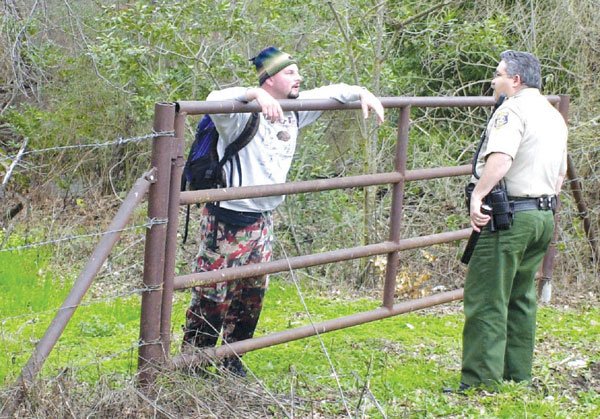SAN MARTIN
– When it comes to rural crime involving livestock or farms
south of San Jose, the Santa Clara County Sheriff’s Office turns to
deputy Dino Diaz.
Since taking this assignment in June, Diaz has been patrolling
the South County back roads and fields, looking for crop thieves,
trespassers and stray animals.
SAN MARTIN – When it comes to rural crime involving livestock or farms south of San Jose, the Santa Clara County Sheriff’s Office turns to deputy Dino Diaz.
Since taking this assignment in June, Diaz has been patrolling the South County back roads and fields, looking for crop thieves, trespassers and stray animals.
Not many law-enforcement officials can say they’ve investigated a case of beehive vandalism, but Diaz did in December. Seems someone drove a vehicle around a field, intentionally knocking over 20 to 25 hives.
Now, however, a county budget crunch has prompted Sheriff Laurie Smith to place Diaz’s position on the chopping block. County Supervisor Don Gage is pushing to save it, but he says he isn’t sure he reasonably can.
“The first thing we have to do is to protect lives and property; that’s the first responsibility of the sheriff’s department,” Gage said.
A different kind of beat
Diaz’s four-wheel-drive truck gets dirtier than other sheriff’s vehicles, he tends to use binoculars more than the average cop, and his service weapon is a rifle rather than a pistol. He also has to be familiar with a different set of laws: Fish and Game, Food and Agriculture, Commodities, Business and Profession.
Most other deputies just learn the Vehicle Code, Penal Code, Health and Safety, and Education Code, he said.
Diaz doesn’t respond to standard crime dispatches such as domestic violence, noise complaints or bad checks. He has his own kind.
After a rainstorm, Diaz looks for teen-agers driving cars and trucks through the mud on private property. The penalty for this can be surprisingly high.
“If they’re actually out destroying plowed crop area, well then they can be looking at a punitive damage for the farmer to have to go out and replow that area. So, it can be maybe a $1,200 fine.”
Diaz’s beat also has included the following:
• helping ranchers separate commingled cows
• hunters on private land without permission
• farm equipment theft
• trespassing poppy jasper miners
• illegal slaughtering of cows for meat
• cockfighting
After serving as a volunteer reserve deputy for six years, Diaz got his badge in 1998. Like most deputies, he’d never been exposed to rural patrol.
“In 2001, I was assigned out in South County, and I just thought the land was really beautiful,” he said. “I worked midnights, and it was dark when I started work, and at the end of my shift you’d have the morning light and just see the open space and the land. I just thought, ‘Wow, this is really nice out here.’
“So I would stay late and not put in any overtime just to drive around and get familiar with the properties, the sites and people, in general.”
An “epidemic” controlled
Gage helped establish the sheriff’s Rural Crime Unit in 1992. It was a time when “The theft … of farm commodities was epidemic,” according to the sheriff’s Web site.
“Theft and trespass were so bad that it was not unusual to find more than 100 people in a single small field,” the Web site says. “The loss of cherries, strawberries, apricots, onions and peppers was eclipsed only by the loss of garlic. The first year of specialized part-time enforcement resulted in the recovery of approximately 134,000 pounds of stolen garlic.”
Since then, the Rural Crime Unit has made more than 3,000 arrests.
There is much less crop theft now than 12 years ago, and Diaz is less busy than his predecessors. Diaz said he logs about three incident reports a week. These days, a typical crop thief steals a few onions, not a ton of garlic.
Not all farmers know Diaz
Area farmers say keeping a rural deputy is crucial in preventing another wave of crop theft, but those polled by The Dispatch said they’ve never met Diaz and have recently felt estranged from the sheriff’s office, in general.
Jenny Midtgaard Derry, executive director of the county Farm Bureau, said she doesn’t know Diaz, but added: “I know in the past we have had a really strong relationship with the Santa Clara County sheriff’s department.
“(The Rural Crime Unit) has been a very good program, and we hope that would continue.”
A large part of Diaz’s job is to get to know farmers and ranchers and their lands. Then they know who to call, other than 9-1-1, and he can patrol their lands.
“I’m there primarily as a prevention tool,” he said. “If my unit is seen a lot in the area, then it tends to deter crime. So I try to be highly visible, patrol the fields, wave at people.”
Kip Brundage, who owns G&K Farms northeast of Gilroy, says he has been “very familiar” with the Rural Crime Unit over the years but has never heard of Diaz.
“Maybe he hasn’t just made it around to us yet,” Brundage said. “We haven’t had a problem since last year, so maybe that’s why we don’t know Diaz.”
Brundage figured agricultural crime has decreased by 70 percent since the Rural Crime Unit began.
“It’s something very much needed,” Brundage said.
Fiorio Farms co-owner Dan Fiorio grows peppers just outside Gilroy’s southern city limit on Luchessa Avenue, and he said he’s worried about the rural crime position being cut. He doesn’t know Diaz either, but he thinks he has seen him on patrol. He hasn’t had a reason to call law enforcement in several years, he said.
“At one time, I knew who they were,” Fiorio said of the rural crime deputies. “They had more of a program in past years.”
Budget casualty?
Diaz will find out in June – when county supervisors finalize the 2004-05 budget that goes into effect July 1 – whether he keeps his job.
Sheriff Smith did not respond by press time as to why Diaz’s job is on her cut list, but her spokesman, Deputy Terrance Helm, said Diaz holds “a very important position, especially in (South County).”
Gage said, “I have to look out for South County, but we also have a $235 million deficit we have to deal with. … We’re going to be laying a lot of people off.
“We’re trying to figure out, What are our basic services we have to provide? One thing for certain is that the service provided by the county in 2005 is not going to be the same as it has been in the past. It’s going to be less, and that’s not out of choice.”












